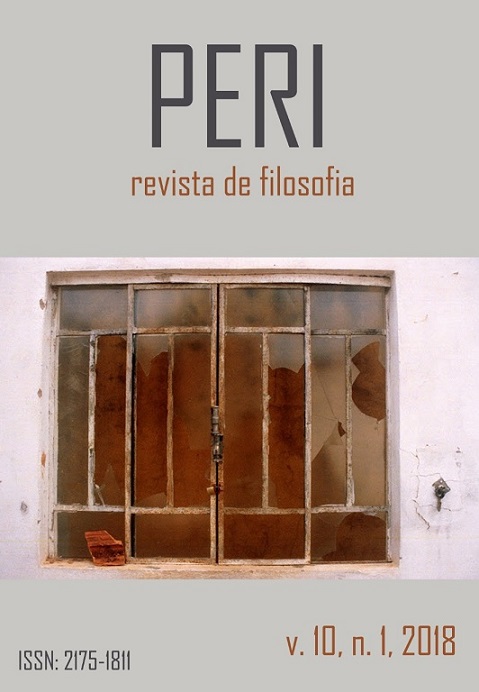The epistemic value of reflection
Palavras-chave:
reflection, epistemic value, virtue epistemology, ignoranceResumo
I discuss reflection as a means to achieve true belief and avoid error. I argue in the first section how can this be treated as a separate problem. In the second section, I discuss Sosa’s Virtue Epistemology approach to the epistemic value of reflection. In the third, I raise problems for this view and argue that, if ignorance possess epistemic value, it is an interesting form of dealing with these difficulties.
Referências
BERGMANN, M. Justification Without Awareness: a defense of epistemic externalism. Oxford: Oxford University Press, 2006.
BONJOUR, L. Externalist Theories of Knowledge. In: Midwest Studies in Philosophy, 5: 53–73. 1980.
MORVAN, P. Le; PEELS, R. The Nature of Ignorance: two views. In: The Epistemic Dimensions of Ignorance. Peels, R.; Blaauwn, M. (ed.). Cambridge: Cambridge University Press, 2016, pp. 12-32.
PAPPAS, G. (2014) Internalist vs Externalist theories of knowledge and justification. The Stanford Encyclopedia of Philosophy (Fri Aug 8, 2014), EDWARD, N. Zalta(ed.). Available in <https://plato.stanford.edu/entries/justep-intext/> Access in: 09/03/2018
PRITCHARD, D. Ignorance and Epistemic Value In: The Epistemic Dimensions of Ignorance. Peels, R.; Blaauwn, M. (ed.). Cambridge: Cambridge University Press, 2016, pp. 132-143.
SOSA, E. The Raft and the Pyramid: coherence versus foundations in the theory of knowledge. In: Midwest Studies in Philosophy, 5: 3-26, 1980.
___________ Knowledge in Perspective: Selected Essays in Epistemology, Cambridge: Cambridge University Press, 1991.
___________. A Virtue Epistemology: apt belief and reflective knowledge, volume I. Oxford University Press: New York, 2007.
___________. A Virtue Epistemology: apt belief and reflective knowledge, volume II. Oxford University Press: New York, 2009.
___________. Judgment and Agency. Oxford: Oxford University Press, 2015
Downloads
Publicado
Edição
Seção
Licença
1. Autores mantém os direitos autorais e concedem à revista o direito de primeira publicação, com o trabalho simultaneamente licenciado sob a Creative Commons Attribution License que permite o compartilhamento do trabalho com reconhecimento da autoria do trabalho e publicação inicial nesta revista.
2. Autores têm autorização para assumir contratos adicionais separadamente, para distribuição não-exclusiva da versão do trabalho publicada nesta revista (ex.: publicar em repositório institucional ou como capítulo de livro), com reconhecimento de autoria e publicação inicial nesta revista.
3. Autores têm permissão e são estimulados a publicar e distribuir seu trabalho online (ex.: em repositórios institucionais ou na sua página pessoal) a qualquer ponto antes ou durante o processo editorial, já que isso pode gerar alterações produtivas, bem como aumentar o impacto e a citação do trabalho publicado (Veja O Efeito do Acesso Livre).


